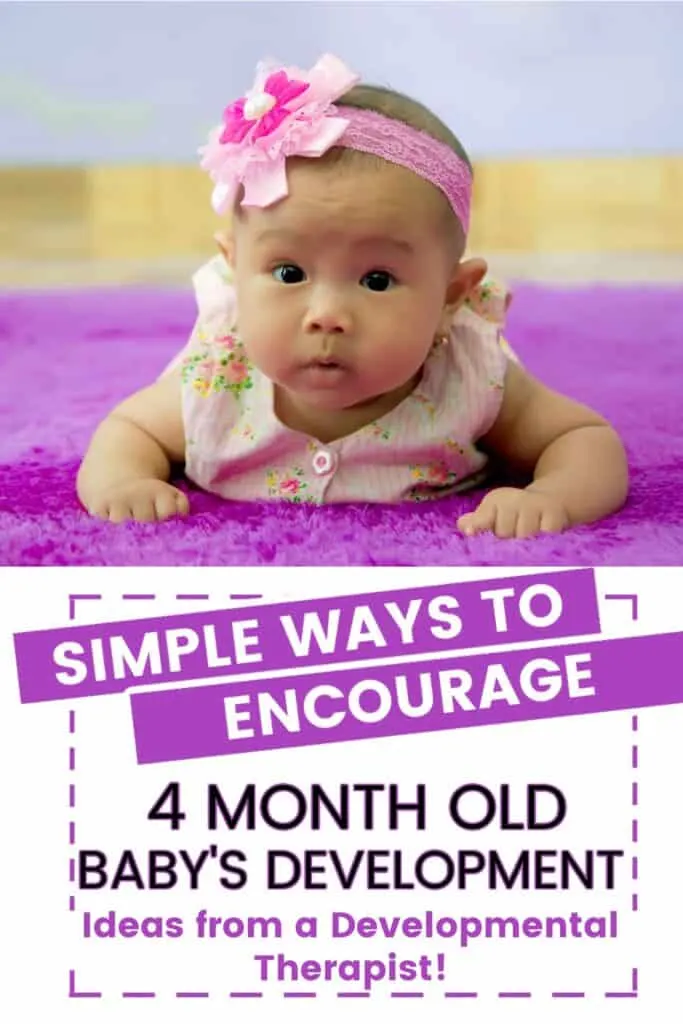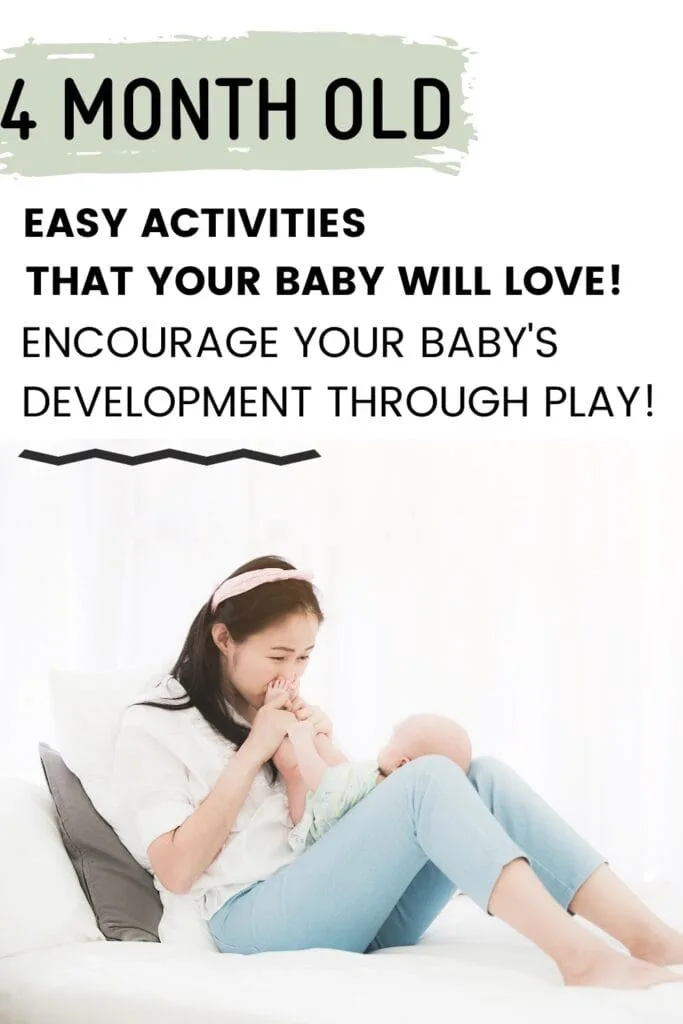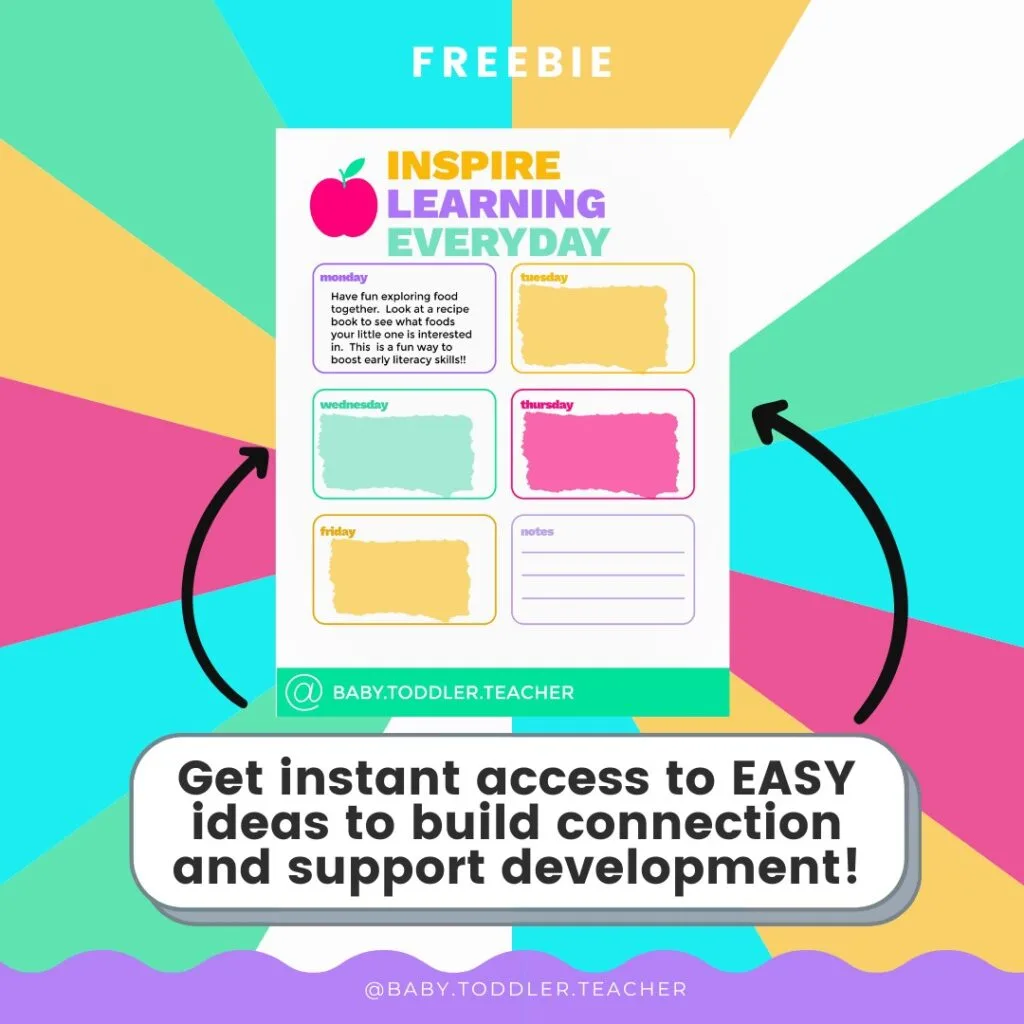So Many Exciting Things at 4 Months Old!
As your little one turns four months old, their development and learning begin to take exciting strides.
This period is a time of great cognitive, emotional, and physical growth.
As parents or caregivers, it’s essential to support and stimulate this development with appropriate learning activities.
In this post, we’ll explore easy, practical, and effective learning ideas specially designed for your four-month-old baby.
These activities will not only entertain your child but also significantly contribute to their developmental milestones.
So let’s embark on this exciting journey of early learning together!

(This post may contain affiliate links. To read our full disclosure policy click here.)
What Developmental Milestones Is Your Baby Working on?
At around four months, your baby is likely working on a variety of skills across numerous areas.
Fine Motor Skills
Fine motor skills involve the use of smaller muscle groups in the hands and fingers.
At four months, your baby will probably start reaching for and batting at objects.
They might begin to grasp toys and bring them to their mouth.
This is an exciting phase as your baby begins to explore the world around them through touch.
Gross Motor Skills
Gross motor skills involve the larger muscles in the arms, legs, and torso.
Around this age, your baby is likely to start rolling from tummy to back.
You might also notice your little one pushing up on their arms during tummy time.
Both are significant milestones that aid in the development of strength and coordination.
Cognitive Skills
Cognitive development refers to the baby’s thinking, problem-solving, and memory.
At four months old, your baby becomes more aware and curious about their surroundings.
Social Skills
Social development involves the ability to understand and react to people and surroundings.
At four months, your baby may begin to show more interest in social interaction, respond to affection, and may have favorite people.
It’s important to remember that every child develops at their own pace, so don’t worry if your baby hasn’t mastered all of these skills just yet.
Providing a nurturing and stimulating environment will help your baby achieve these milestones in their own time.
If you ever have concerns about your baby’s development reach out to early intervention for support!
Learning Happens Through Daily Activities
Incorporating learning into every day routines is an excellent strategy because it allows for repetition and consistency, which are key to early childhood development.
These regular activities become a natural part of the baby’s day, making learning instinctive and habitual for both the baby and the parent.
It’s an effortless way to teach and reinforce developmental skills without making it feel like a structured task.
This approach is also less stressful for parents as it doesn’t require extra time or resources.
Instead, learning opportunities are seamlessly integrated into daily baby care routines such as feeding, diaper changes, and bath time.
Moreover, this method helps parents become attuned to their baby’s developmental needs and progress, fostering a deeper parent-child bond.
Encouraging Language Development during Bath Time
Bath time provides a unique opportunity for enhancing your baby’s language development.
One effective strategy is singing songs and nursery rhymes, making good use of the fun echo that bathrooms often provide.
This experience can stimulate your baby’s communication skills and familiarize them with rhythms, tones, and vocabulary.
It also makes the bath routine enjoyable and something your baby looks forward to.
Another technique is to label your baby’s actions and narrate what they’re doing.
For example, you might say, “Now we’re washing your hands” or “You’re splashing water, isn’t that fun?” This continuous narration exposes your baby to language patterns and new words.
It also aids in comprehension as the baby begins to associate the words with the corresponding actions.
Through these simple and interactive strategies, bath time transforms into a fun-filled, educational experience that promotes your four-month-old’s language development.

Enhancing Learning During Diaper Changes
Diaper changing is an inevitable, recurring part of every baby’s day.
Although it may appear to be a mundane task, it can actually be a fantastic opportunity for playful interaction and learning.
Transforming diaper times into a fun and educational routine is simpler than you might think.
Firstly, consider incorporating songs into the diaper-changing routine.
Take advantage of these moments to sing nursery rhymes or simple songs with repetitive lyrics.
This not only distracts your baby, making the diaper change smoother, but also exposes them to sounds, rhythms, and language patterns. Over time, your baby will start to recognize these songs, stimulating their memory skills.
Additionally, providing your baby with toys during diaper changes can also enhance learning.
Toys with different shapes, colors, and textures stimulate your baby’s senses and cognitive development.
For instance, a soft toy can be used to teach your baby about ‘touch’, while a colorful rattle can be used as a tool to discuss ‘sound’ and ‘color’.
It’s a gentle way of introducing your baby to the world of sensory experiences, all while keeping them engaged during diaper changes.
Remember, the goal is to make diaper changes a happy, relaxed time when your baby can enjoy one-on-one attention.
This positive association is likely to make the diaper changing routine easier for both you and your baby, while also supporting their early learning and development.
For more easy ideas on how to support your baby’s learning CLICK HERE.
4-Month-Old Sensory Activities
Sensory play is a fantastic way to engage your baby’s senses and boost their cognitive development. Here are some simple and safe sensory activities for your four-month-old:
- High-Contrast Cards: At this age, your baby’s vision is still developing, and high-contrast images are easy for them to focus on. Black and white or brightly colored cards can provide visual stimulation and encourage focus and concentration.
- Sensory Bags: Fill a clear, sturdy plastic bag with interesting objects like colorful pom-poms, large beads, or shiny confetti. Seal it tightly and let your baby explore the bag with their little hands. The different colors and shapes will stimulate their vision, while the texture of the bag and its contents will provide tactile stimulation. Always make sure to supervise closely.
- Noise Makers: Simple household items can turn into fascinating noise makers. Fill a plastic container with dried beans or rice and secure the lid tightly. Let your baby shake the container and enjoy the sounds. This not only stimulates their hearing but also encourages the development of hand-eye coordination.
- Touch and Feel Books: Books with different textures integrated into their pages are a great sensory tool. They allow your baby to explore various textures, such as smooth, rough, furry, etc., while also promoting early literacy.
- Outdoor Play: Even at four months old, your baby can benefit from spending time outside. Take them for a walk in their stroller or spend some time on a blanket in the backyard. The fresh air and change of scenery provide you with lots of simple activities that involve the senses.
Remember, every baby is unique and will respond differently to these activities. Let your baby guide the pace of exploration and always supervise sensory play for safety.
Reading Books Together is Great for Baby’s Development
Incorporating reading into your baby’s daily routine is an excellent way to promote cognitive and communication development.
At four months old, your baby might not understand the words yet, but they will be fascinated by the rhythm of your voice, the bright colors, and the diverse patterns in the books.
This early exposure to words significantly contributes to their language acquisition.
Listening to stories enhances their auditory processing and comprehension skills, laying the foundation for verbal communication.
Moreover, pointing out and naming objects in the book can introduce new vocabulary and concepts, aiding in their cognitive development.
When your baby’s hands explore different textures in soft baby books it encourages fine motor skills.
Reading together also encourages interaction and bonding between you and your baby listens to you read and their brain processes new words and sounds.
It is also one of the best activities for encouraging cognitive development.
This shared activity is not just educational, but it’s also a wonderful opportunity to nurture a lifelong love for reading in your child.
You can check out some of the best books for babies here.

Play Time on the Floor to Support Your Child’s Development
Playtime on the floor is an important part of a four-month-old’s development.
This time allows babies to explore their environment, practice new skills, and engage with a variety of toys.
One of the most beneficial toys for this age group is age-appropriate toys that cater to their developmental stage.
Soft blocks, rattles, and plush toys are excellent choices.
These toys are usually lightweight and easy to grasp, promoting the development of motor skills as babies learn to hold, shake, and even throw them.
Musical toys are another valuable addition to floor playtime.
They stimulate a baby’s auditory senses and often intrigue them with their varying sounds.
Toys such as musical soft toys (this was my son’s favorite), activity gyms with musical components (this is the one we had), or even simple rattles can help your baby understand the concept of cause and effect, as they learn to create sounds by their actions.
Colorful toys are crucial for visual development.
At four months, babies can perceive a wide array of colors. Bright, colorful toys can capture their attention and stimulate their developing vision.
Activity mats with bright patterns, colorful soft toys (these look fun), and high-contrast black and white toys are all great for engaging your baby’s sight during floor playtime.
Remember, during floor playtime safety is paramount.
Always supervise your baby, ensure toys are safe for their age, and provide a soft and clean surface for them to explore.
This will ensure your baby gets the most out of their playtime while staying safe.
Tummy Time to Encourage Physical Skills
Tummy time is a great activity to encourage the physical development of your baby.
By placing your baby on their stomach while they are awake and supervised, you can foster vital skills and physical strength.
One important benefit of tummy time is improved head control, as your baby learns to lift and turn their head while lying on their tummy.
A play gym or a soft play mat can serve as the perfect setting for tummy time.
These items provide a comfortable and safe surface for babies to explore, as well as capture their attention with bright colors and textures.
Soft toys, including soft balls, can be strategically placed around your baby during tummy time, encouraging them to reach out, roll over, and ultimately improve their motor skills.
Remember, every baby is different, so it’s important to follow your child’s cues and make sure they enjoy the tummy time.
Regularly scheduled sessions, even just for a few minutes at a time, can have a significant impact on your baby’s physical development.
These sessions can gradually be increased as your baby grows more comfortable and stronger.
Always ensure tummy time is conducted in a safe environment and under constant supervision.

Grab your FREE Milestone Guide HERE.
Have fun with your baby!
Engaging in the right baby activities can be great fun for both you and your four-month-old, while also serving as a key component in their development.
From sensory play to reading books, outdoor exploration to floor and tummy time, these activities are crafted not just for entertainment, but to foster important skills such as motor skills, cognitive abilities, and language acquisition.
Remember that each baby is unique, so let them guide the pace of exploration.
Enjoy this special time with your baby, encourage their curiosity, and take delight in their accomplishments.
These activities are more than just play—they form the building blocks for your baby’s future growth and development.
Frequently Asked Questions
There are many ways to entertain a 4-month-old, including sensory play, reading books, floor and tummy time, and outdoor exploration. It’s important to follow your child’s cues and let them guide the pace of their exploration.
A baby can see the TV at 4 months but it is not a recommended activity.
Watching TV does not provide the same benefits as engaging in interactive activities and can even hinder a baby’s development.
Some great toy options for 4-month-old babies include soft blocks, rattles, plush toys, musical toys, and colorful toys with high-contrast patterns. It’s important to choose age-appropriate toys that are safe for your baby’s developmental stage.
Tummy time can start with just a few minutes at a time and gradually increase as your baby grows stronger and more comfortable. It is recommended to have regular sessions of tummy time throughout the day, under supervision, to encourage physical development.
Related Posts You Will Enjoy
The Best Social Emotional Activities for Infants
How to Teach Your Baby to Point for Communication


Kayla O’Neill has a master’s degree in education as well as a bachelor’s degree in special education with an emphasis in early childhood education. She has been working as a developmental therapist with babies and toddlers in early intervention since 2012. She is also a mom with two young children.
